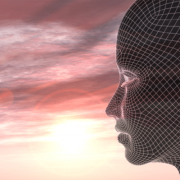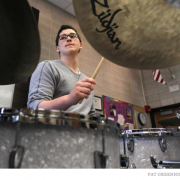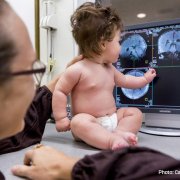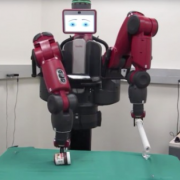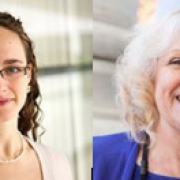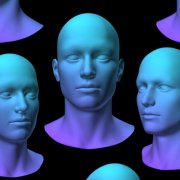February 2, 2017 - 8:00 am
The two-day workshop on "Speech representation, perception and recognition" is organized by the NSF-funded, MIT-based, Center for Brains Minds and Machines (CBMM), on February 2-3, 2017 at the McGovern Institute for Brain Research, MIT, Cambridge, MA.
The workshop will feature invited talks from...
The workshop will feature invited talks from...
February 1, 2017 - 1:00 pm
[From the January 2017 newsletter of the Future of Life Institute]
"Two years ago, after an exciting conference in Puerto Rico that included many of the top minds in AI, we produced two open letters -- one on beneficial AI and one on autonomous weapons -- which were signed and supported by tens of thousands of people. But that was just one step along the path to creating artificial intelligence that will benefit us all.
This month, we...
January 17, 2017 - 10:45 am
A recent study from MIT found that people who are asked to repeat random series of beats tend to reorganize them according to familiar patterns — even if they don’t know they’re doing it.
The findings, published in the Jan. 5 issue of Current Biology, could pave the way to a better understanding of the how people perceive and retain what they hear.
(CBMM related work)
January 11, 2017 - 4:15 pm
Neuroscientists at MIT have adapted their MRI scanner to make it easier to scan infants’ brains as the babies watch movies featuring different types of visual input. With the new technique, the team found that in some ways, the organization of infants’ brains is surprisingly similar to that of adults. Specifically, brain regions that respond to faces in adults do the same in babies, as do regions that respond to scenes.
Read the full story from...
January 5, 2017 - 3:45 pm
"Study finds the brain is biased toward rhythms based on simple integer ratios.
Anne Trafton | MIT News Office
January 5, 2017
When it comes to perceiving music, the human brain is much more tuned in to certain types of rhythms than others, according to a new study from MIT.
A team of neuroscientists has found that people are biased toward hearing and producing rhythms composed of simple integer ratios — for example, a series of four beats...
December 20, 2016 - 4:15 pm
"Not having a college degree didn’t stop Gadi Geiger from becoming a neuroscientist—or serving as the go-to guy for career advice in the Poggio Lab.
by Christina Couch, SM ’15
In 2011, Leyla Isik, a brand-new PhD student, delivered a short presentation to her new colleagues in Tomaso Poggio’s lab in what is now the Center for Brains, Minds, and Machines. She outlined her upcoming research on peripheral vision with great enthusiasm and fully...
December 16, 2016 - 4:00 pm
Max Tegmark, Josh Tenenbaum, Tomaso Poggio
December 16, 2016 - 3:00 pm
Kelsey Allen, Kevin Smith
People are incredibly proficient and flexibly tool users -- for instance, if we need to hammer a nail in but do not have access to a hammer, we can easily choose another object to strike the nail with while ignoring items that are inappropriate due to their size and/or material.
Kelsey and Kevin ...
Kelsey and Kevin ...
December 9, 2016 - 3:45 pm
"Research on artificial intelligence moves from 2-D to 3-D representations of the world—work that could lead to big advances in robotics and automated driving.
by Will Knight
There’s been some stunning progress in artificial intelligence of late, but it’s been surprisingly flat.
Now AI researchers are moving beyond two-dimensional images and pixels. Instead they’re building systems capable of picturing the three-dimensional world and taking...
December 9, 2016 - 10:45 am
“An exciting and important trend is the move in learning-based vision systems from just doing things with images to doing things with three-dimensional objects,” says Josh Tenenbaum, a professor in MIT’s Department of Brain and Cognitive Sciences. “That includes seeing objects in depth and modeling whole solid objects—not just recognizing that this pattern of pixels is a dog or a chair or table.”
(CBMM related work)
December 2, 2016 - 4:00 pm
Margaret Livingstone and Michael Arcaro (Harvard Medical School)
, Rebecca Saxe (MIT BCS)
December 1, 2016 - 2:15 pm
Larry Hardesty | MIT News Office
December 1, 2016
"MIT researchers and their colleagues have developed a new computational model of the human brain’s face-recognition mechanism that seems to capture aspects of human neurology that previous models have missed.
The researchers designed a machine-learning system that implemented their model, and they trained it to recognize particular faces by feeding it a battery of sample images. They found...
November 4, 2016 - 4:00 pm
Ilker Yildirim (CBMM, MIT), Goker Erdogan (U. Rochester); followed by a discussion with Josh Tenenbaum and...
Generative models and deep networks in brain/mind modeling (two 25 min talks + discussion/debate to follow).
November 4, 2016 - 3:00 pm
Jorg Scholvin (CBMM, Synthetic Neurobiology Group, MIT)
Topic: TBA
October 31, 2016 - 11:30 am
"Winrich Freiwald, associate professor and head of the Laboratory of Neural Systems, has received the 2016 W. Alden Spencer Award. The prize, given by Columbia University, recognizes outstanding research contributions in the field of neuroscience. Freiwald shares the award with his long-time collaborator Doris Y. Tsao of the California Institute of Technology. Freiwald and Tsao will receive the prize and present lectures on November 1 at the...


